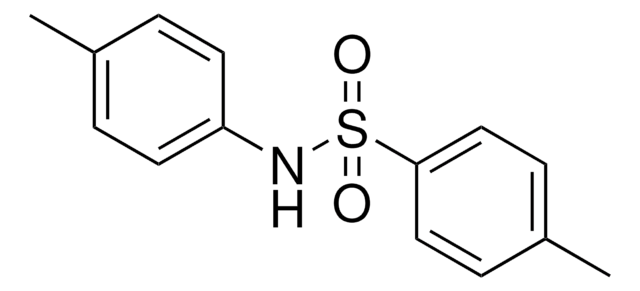41368
p-Toluenesulfonyl isocyanate
for HPLC derivatization, LiChropur™, ≥98.0% (GC)
Synonym(s):
p-Tosyl isocyanate, TsNCO, Tosyl isocyanate
About This Item
Recommended Products
grade
for HPLC derivatization
Quality Level
vapor pressure
1 mmHg ( 100 °C)
Assay
≥98.0% (GC)
form
liquid
quality
LiChropur™
technique(s)
HPLC: suitable
refractive index
n20/D 1.533-1.537
n20/D 1.534 (lit.)
bp
144 °C/10 mmHg (lit.)
275-278 °C (lit.)
density
1.291 g/mL at 25 °C (lit.)
SMILES string
Cc1ccc(cc1)S(=O)(=O)N=C=O
InChI
1S/C8H7NO3S/c1-7-2-4-8(5-3-7)13(11,12)9-6-10/h2-5H,1H3
InChI key
VLJQDHDVZJXNQL-UHFFFAOYSA-N
Looking for similar products? Visit Product Comparison Guide
General description
Application
Legal Information
Signal Word
Danger
Hazard Statements
Precautionary Statements
Hazard Classifications
Eye Irrit. 2 - Resp. Sens. 1 - Skin Irrit. 2 - STOT SE 3
Target Organs
Respiratory system
Storage Class Code
10 - Combustible liquids
WGK
WGK 1
Flash Point(F)
294.8 °F - closed cup
Flash Point(C)
146 °C - closed cup
Choose from one of the most recent versions:
Already Own This Product?
Find documentation for the products that you have recently purchased in the Document Library.
Our team of scientists has experience in all areas of research including Life Science, Material Science, Chemical Synthesis, Chromatography, Analytical and many others.
Contact Technical Service









